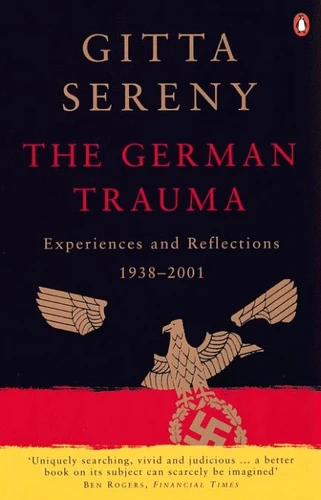The German Trauma. Experiences And Reflections 1938 - 2001
Par :Formats :
Disponible dans votre compte client Decitre ou Furet du Nord dès validation de votre commande. Le format ePub protégé est :
- Compatible avec une lecture sur My Vivlio (smartphone, tablette, ordinateur)
- Compatible avec une lecture sur liseuses Vivlio
- Pour les liseuses autres que Vivlio, vous devez utiliser le logiciel Adobe Digital Edition. Non compatible avec la lecture sur les liseuses Kindle, Remarkable et Sony
- Non compatible avec un achat hors France métropolitaine
 , qui est-ce ?
, qui est-ce ?Notre partenaire de plateforme de lecture numérique où vous retrouverez l'ensemble de vos ebooks gratuitement
Pour en savoir plus sur nos ebooks, consultez notre aide en ligne ici
- Nombre de pages416
- FormatePub
- ISBN0-14-196262-3
- EAN9780141962627
- Date de parution06/09/2001
- Protection num.Adobe DRM
- Infos supplémentairesepub
- ÉditeurPENGUIN
Résumé
Gitta Sereny is one of the world's most respected journalists and historians. This book gathers together the best of her writing on Germany from over sixty years. It amounts to an extraordinary portrait of the country and its people, how they have come to terms with their Nazi past, both collectively and in specific instances - and how the burden of their guilt has altered the national identity. She writes about key individuals - Stangl, Speer - and the questions which their lives raise.
Thepenetration and conviction of her writing throughout is startling and she constantly reminds us why it is important to consider the questions she addresses - war guilt, holocaust denial and the temptations of obedience.
Thepenetration and conviction of her writing throughout is startling and she constantly reminds us why it is important to consider the questions she addresses - war guilt, holocaust denial and the temptations of obedience.
Gitta Sereny is one of the world's most respected journalists and historians. This book gathers together the best of her writing on Germany from over sixty years. It amounts to an extraordinary portrait of the country and its people, how they have come to terms with their Nazi past, both collectively and in specific instances - and how the burden of their guilt has altered the national identity. She writes about key individuals - Stangl, Speer - and the questions which their lives raise.
Thepenetration and conviction of her writing throughout is startling and she constantly reminds us why it is important to consider the questions she addresses - war guilt, holocaust denial and the temptations of obedience.
Thepenetration and conviction of her writing throughout is startling and she constantly reminds us why it is important to consider the questions she addresses - war guilt, holocaust denial and the temptations of obedience.











